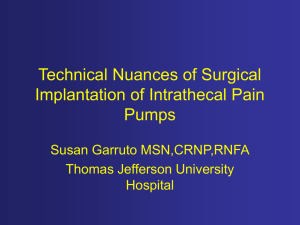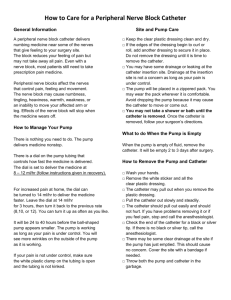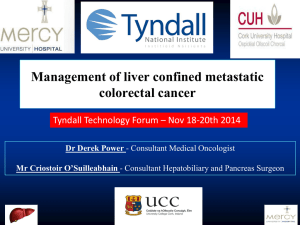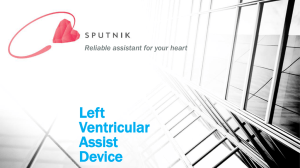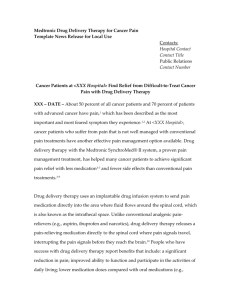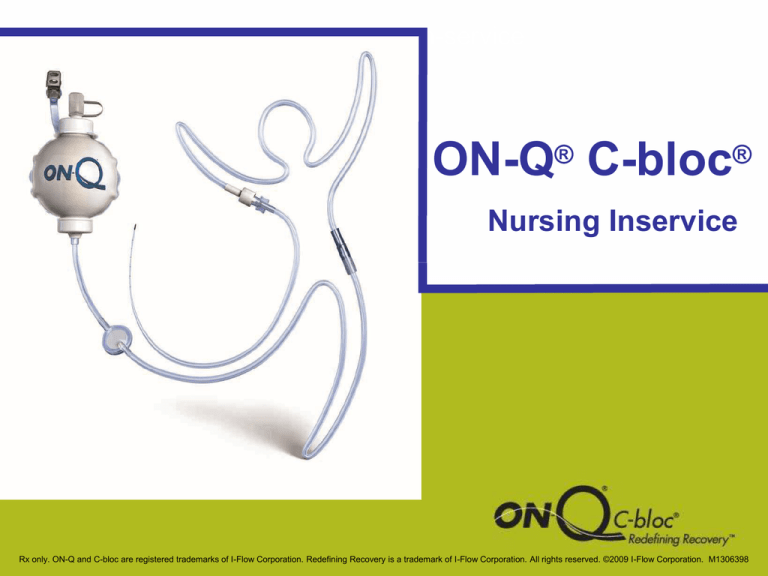
Nursing Unit In-service
ON-Q® C-bloc®
Nursing Inservice
Rx only. ON-Q and C-bloc are registered trademarks of I-Flow Corporation. Redefining Recovery is a trademark of I-Flow Corporation. All rights reserved. ©2009 I-Flow Corporation. M1306398
Introduction
Purpose: This inservice presentation is intended to familiarize the
clinician with ON-Q C-bloc including Select-A-Flow® and ONDEMAND
models for continuous nerve block applications
Caution: This in-service does not replace the product Directions for
Use (DFU). It is imperative that the clinician read and understand
the product DFU. The DFU contains detailed product information,
including important cautions, warnings and contraindications
Introduction
There are inherent risks in all medical devices.
Please refer to the product labeling for Indications,
Cautions, Warnings and Contraindications.
Failure to follow the product labeling could directly
impact patient safety. Physician is responsible for
prescribing and administering medications per
instructions provided by the drug manufacturer.
Refer to www.iflo.com for product safety
Technical Bulletins.
Objectives
At the completion of this inservice, the participant should
be able to:
•
•
•
•
•
Identify common continuous peripheral nerve blocks (CPNB)
Identify components of ON-Q C-bloc with Select-A-Flow
Identify components of ON-Q C-bloc with ONDemand
Assess pump infusion status
Identify signs and symptoms of local anesthetic toxicity and
appropriate intervention
• List resources available for product support
What is ON-Q?
Description
• ON-Q is an elastomeric pump that
automatically delivers a continuous
regulated flow of local anesthetic over
multiple days.
• It is completely portable.
• The pump is connected to a catheter
placed near a nerve for regional
anesthesia and/or pain management.
• ON-Q is indicated to significantly
reduce narcotic use and pain when
compared to narcotic-only pain
management.
ON-Q C-bloc
• Potential Patient Benefits
–
–
–
–
–
Quicker return to normal
Reduced length of hospital stay
Significantly better pain relief than narcotics alone
Significantly less need for narcotics post-surgery
Higher patient satisfaction
Continuous Peripheral Nerve Block
(CPNB)
• The abolition of painful impulses by temporarily interrupting the
sensory nerve conductivity with local anesthetics
• Local anesthetic can be delivered as a single injection or as a
continuous infusion.
• Motor function may or may not be affected.
• The patient does not lose consciousness.
Opioids/ General
Anesthesia
Epidural
Local Anesthesia
CPNB
Nerve Block Applications
•
Majority for orthopedic procedures
– Increasing number on an outpatient basis
•
Continuous Peripheral Nerve Block (CPNB)
– Local anesthetic administered as a
continuous infusion
– Provides pain management after the
surgical procedure.
– ON-Q C-bloc pump functions as the
medication delivery device
•
Other Nerve Blocks Include:
–
–
Intercostal and paravertebral for thoracotomy
and rib fractures
Transversus Abdominus Plane (TAP) blocks
for abdominal procedures
Orthopedic Procedures
Continuous Peripheral Nerve Block (CPNB)
• Knee surgery
–
–
–
–
ACL
Lateral release
Patella realignment
Meniscus repair
• Shoulder
–
–
–
–
• Foot and Ankle
– Bunionectomy
– Triple arthrodesis
– Achilles repair
• Total Joint Replacement
– Hips
– Knees
Rotator cuff repair
Bankhart repairs
• Hand/Wrist
Subacromial decompression – Carpal tunnel
Labrum tears
– ORIF
CPNB Catheter Placements
Upper Extremity Blocks
• Brachial Plexus Block
– Used for shoulder, arm, hand
procedures
– Brachial plexus is a network of
nerves originating in the upper spine
and ending in the main nerves that
control movement and sensation in
the arm
– Approaches (procedures)
• Interscalene (shoulder/upper arm)
• Supraclavicular (below the
shoulder)
• Infraclavicular (arm)
• Axillary (elbow, hand, forearm)
CPNB Catheter Placements
Lower Extremity Block
• Approaches (procedures)
– Lumbar plexus (hip, leg)
– Femoral (Upper leg, knee)
– Sciatic (posterior thigh and
knee, foot and ankle)
– Popliteal (foot and ankle)
CPNB Procedure
Overview
•
•
Procedure performed by an
anesthesiologist trained in regional
anesthesia techniques
Catheter placed near a nerve prior to
surgery:
– Anatomical landmarks used to
establish location of block area
– Ultrasound guidance may be used to
locate nerve for more accurate block
placement
– Nerve stimulator device may also be
used to identify location of the nerve.
• Stimulator provides current to either
a stimulating needle or catheter
• Presence of an appropriate muscle
twitch confirms correct location
•
ON-Q C-bloc pump may be connected to
nerve block catheter before, during or
after surgery
Landmarks
Ultrasound Guidance
Nerve Stimulator
ON-Q C-bloc Pump Models
Fixed Flow Rate
Select-A-Flow
ONDEMAND
ONDEMAND & Select-A-Flow
Select-A-Flow®
Select-A-Flow
Components
1 Rate changing key
– Allows titration for optimal pain relief
– Key is removable for tamper resistance
2 Plastic Cover
– Tamper evident
3 Tie Wrap
– Locks plastic cover
to Select-A-Flow
Select-A-Flow should be outside of clothing,
away from ice or cold therapy.
Select-A-Flow
To Change Flow Rate
•
• Insert rate changing key into the
dial
• Turn the dial until the new flow rate
is selected
– Make sure you hear the dial
“click” into place and the
selected flow rate is aligned in
the window with the ml/hr mark
on the Select-A-Flow
Caution: Dial must “click” into
place to ensure accurate flow
rate. Flow rate is unpredictable
if it is dialed between rate
settings.
Select-A-Flow
To Discourage Tampering
• Remove the rate-changing key
from the dial by pulling the key
straight out.
• Put the key in a safe place for
later use.
• Close the cover over the SelectA-Flow.
• For increased tamper resistance,
the cover may be locked to the
Select-A-Flow using the tie wrap.
Select-A-Flow
Dual Site
• 600 ml volume pump with dual
Select-A-Flows.
• Flow rate range 1-7 ml/hr per
catheter site.
• Allows infusion from one pump
through two nerve block
catheter sites.
• Example CPNB applications:
– Femoral and Sciatic
– Femoral and Popliteal
Monitoring the Infusion
Infusion Status
• A change in appearance and size of
the pump may not be evident for more
than 24 hours after surgery.
• Over time, outside bag on pump will
become looser and creases will begin
to form in the bag.
• As medication is delivered, pump
balloon will gradually become smaller.
Pump appearance after
approximately 24 hours
End of Infusion
• Depending on size and volume of
pump, infusion typically lasts 2-5 days.
• Infusion is complete when delivery
time has passed and pump is no
longer inflated.
• A hard tube will still be present in the
middle of the pump.
• Dispose according to your institutions
protocol.
Contact physician for catheter removal instructions
Tube
Accessories/Patient Instructions
• Disposable Carrying
Case
– The pump is completely
portable
– Patients can wear the ON-Q
C-bloc pump in a convenient
fashion such as around the
waist, over the shoulder or
around the neck
• Patient Guidelines
– Included with each pump
Checklist
Follow these 5 simple checks:
Keep clamp(s) open
Tubing is not kinked
Filter is not taped or covered
Flow Controller
• Fixed Flow Rate Restrictor – taped to skin, away from cold therapy
• Select-A-Flow and ONDEMAND - outside of clothing, away from cold
therapy
Flow Rate (Select-A-Flow)
• Verify flow rate, making sure the flow setting is aligned with
the ml/hr mark on the face of the Select-A-Flow
Patient Monitoring
Patient Monitoring
•
•
•
•
Assess pain and sensory/motor function.
Assess catheter site for redness, drainage, leaking.
Maintain transparent dressing.
Avoid injury due to sensory/motor loss.
– Educate patient on proper measures to take to
avoid injury
– Protect limb with sling
– Use crutches or walker for weight bearing
– Take care when placing warm or cold items on
extremity
• Assess for signs/symptoms of local anesthetic
toxicity.
Patient Monitoring
• When assessing pain, ask patient location of pain to differentiate
between operative site pain and other types of pain.
• ON-Q C-bloc will reduce or eliminate pain around the operative
area, as part of a multi-modal approach to post-op pain
management.
• Administer post-op pain medications as needed.
Patient Monitoring
Signs and Symptoms of Local Anesthetic Toxicity
Caution Close tubing clamp to stop infusion and report any of the
following to physician:
•
•
•
•
Dizziness, light headedness
Blurred vision
Ringing, buzzing in ears
Metal taste in mouth
• Numbness/tingling around
mouth, fingers or toes
• Drowsiness
• Confusion
Discharge Instructions
Follow physician’s instructions, keeping in
mind the following:
•
•
•
•
•
•
•
•
•
Do not drive or operate machinery
Keep catheter site clean and dry
Protect the limb
Do not allow weight bearing on affected limb
Instruct patient and caregiver on signs of local
anesthetic toxicity and infections
Instruct patient how to turn off the pump
Provide a 24-hour contact number for
emergencies and medical advice
Ensure patient has ON-Q Patient Guidelines
Follow physician’s instructions for catheter
removal
Frequently Asked Questions
Frequently Asked Questions
Can patients shower with ON-Q C-bloc?
• Refer to physician’s orders for patient bathing or showering
• Pump and catheter site should be protected from water
Frequently Asked Questions
What should I do if my patient continues to complain of
pain?
• Check the tubing for kinks
• Make sure clamps are open
• Check to be sure the Select-A Flow dial is set to the ordered flow
rate, and not Ø or between settings
• Make sure the catheter is in place and has not been dislodged
• Administer pain medications as ordered
• Contact physician if patient’s pain continues
Product Support
Product Support
• I-FLOW 24-Hour Product Support Hotline
– Available to Patients and Clinicians 24/7
800.444.2728
• Customer Service
– Sales Information
– Product Literature
800.448.3569
Product Support
• Websites
www.iflo.com
www.AskYourSurgeon.com
• Support Materials
–
–
–
–
–
Directions for Use
Technical Bulletins
Nursing Guidelines
Patient Guidelines
Clinical Bibliography
Thank You!


